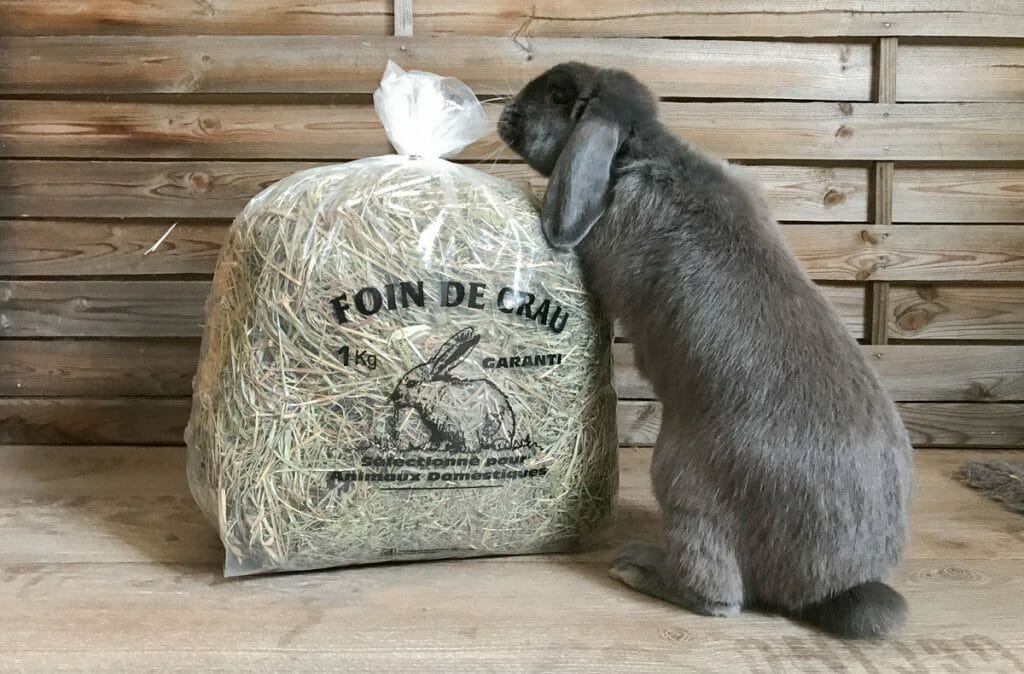How to recognize the first symptoms? What to do while waiting for the visit to the vet? How to prevent relapses?
Rabbit dental problems are common, but can be serious! Knowing how to recognize them and how to avoid them is important for any rabbit owner!
Attention, this article is purely informative and based on real-life experiences, it does not replace medical advice or treatment given by your vet…
I just want to give you advice on the steps to follow IF your rabbit has the disorders listed below…
Please do not underestimate worrisome symptoms without seeking medical advice.
1- How to recognize the first symptoms of dental problems in rabbits (and especially molar problems)?
- Your rabbit is being a picky eater: it deliberately discards certain types of food, such as hay, hard or long-stemmed plants, prefers granules, (which once wet with saliva are easier to break) favors softer and easier to chew foods such as endives, lettuce, vegetables or soft fruits…
- When it eats, it leans its head to one side and looks like he’s chewing gum… This usually means that a dental tip bothers it and hurts its cheek or tongue.
- It drools… You find its chin stained by saliva.
- Because it sorts its food and eats less, its digestive transit is disrupted, droppings are irregular, if not increasingly rare.
- Your rabbit may, when you bring its food, rush to eat because it is hungry, but ends up not eating because of dental pain.
These 5 signs should encourage you to consult your emergency vet, do not wait until the next two signs appear, because your rabbit’s recovery will be longer, and it is useless to wait as it suffers.
Last Signs – Vital Emergency for Rabbit Dental Problems :
- Your rabbit remains dull, gnashing its teeth in pain.
- Anorexia can result, with a complete stop of the digestive transit.
2- You have already made your appointment, but what to do in the meantime:
- Choose foods that they can still eat (be careful, no fruit abuse either such as bananas which are excessively sugar-rich)
- If you have critical care, offer it regularly to eat it, and if it does not eat on its own, force-feed it… To avoid a transit stop, your rabbit should be fed regularly.
(If you don’t have critical care, then make a puree or soup with the granules it eats: wet them with hot water, reduce the granules to a mash and add water to get the texture you want. However, you may have difficulties mashing extruded products… ) - If it can no longer eat hay or plants (rich in fibre and necessary for good digestion), you can force-feed it with a hay tea…
This will be still useful for its digestive tract.
Follow this simple recipe :
Put a few sprigs of hay in a pot of simmering water and let them simmer for a few minutes (no more than 5 minutes). Pour the herbal tea into a jar after separating it from the hay. The tea should have a slightly golden color, if it is too dark, it should be diluted with water. Give this herbal tea at room temperature to your rabbit as often as possible. You can keep it in the fridge for a few days in a closed jar.
3- How can we prevent this from happening again?
- The first solution, and it’s a no-brainer: good quality hay AT WILL! Rabbits never gain weight eating hay, it is the only food that combines dental and transit benefits, so don’t hesitate!
On the other hand, it must be of high quality, solid green, not dusty, such as Crau hay, or Oxbow hay. - The second solution: give it vegetables! The best ones for its teeth are green and fibrous vegetables such as celery branch, parsley, mint, carrot leaves…
Beware! Root vegetables such as carrots are rich in sugar, thus unbalancing your rabbit’s intestinal flora. If given in large quantities, they lead to caecotrophs’ cluster formation or even diarrhea.
If your rabbit is not used to eating vegetables, you should include them one by one into its diet: first in small quantities, for two to three days, and if no bowel problems occur, add a new one following the same pattern. Do not hesitate to alternate vegetables to vary its meals. And always feed it at room temperature, no icy-cold vegetable! - The third solution: if your rabbit likes granules or extruded products, do not deprive it of them, but give it a reasonable quantity: this should represent 2 to 3% of its weight per day! It should eat hay at 70 to 80 % and then the rest is for vegetables…
Choose quality food, especially not mixtures of granules and cereals, (rabbits do not eat corn or barley in the wild!!!) but granules or extruded products with as much fibre or cellulose as possible: preferably not be below 20%.
Last thing: avoid bread!!! It is a mistake to feed a rabbit with it!!! This does not wear out their teeth. Bread also lead to transit problems because it’s not suitable for their health! And most importantly, have you ever seen a rabbit eating bread in the wild?
It is always necessary to imagine rabbits in their wild state, they do not eat processed foods (sweets, granules etc…) but mainly eat grass, some wild plants, and vegetables if they are near a field or a farm…
Conclusion
For our pets, let us remain vigilant for the first worrying signs of dental problems, let us try to restore their natural diet as best we can, so dental and transit problems will be less frequent.
I hope this article will help you identify the symptoms, and take action to help your pet in case of dental malocclusion. I wish you a beautiful and happy journey with your big-eared pet!
See you soon!
Written by Leena for Rabbits World ©2018

 Food
Food Essentials
Essentials Toys
Toys Accessories
Accessories Goodies
Goodies
